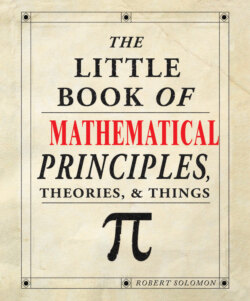Читать книгу The Little Book of Mathematical Principles, Theories & Things - Robert Solomon - Страница 28
На сайте Литреса книга снята с продажи.
3rd century BC Greece The Fundamental Theorem of Arithmetic Euclid (c. 325–265 BC)
ОглавлениеEvery whole number can be written as a product of prime numbers.
_______________
It is possible to factorize any whole number until one is left with prime numbers which, by definition, cannot be factorized any further.
A prime number is a whole number whose only factors are 1 and itself. For example 11 is a prime number, as it cannot be written as the product of smaller numbers. The number 15 is not a prime number, as it can be written as 3 x 5. The first few prime numbers are 2, 3, 5, 7, and 11. Prime numbers are of supreme importance in the theory of numbers.
Many branches of mathematics have a “fundamental theorem.” Often this is an arbitrary choice but when there is a result from which all the other results flow, it is natural to choose it as the fundamental one. In the case of arithmetic, the fundamental theorem says that you can factorize whole numbers into prime numbers. Furthermore, for each number there is only one possible factorization.
For example:
12 = 2 x 2 x 3
35 = 5 x 7
1001 = 7 x 11 x 13
To draw an analogy with chemistry, prime numbers are like atomic particles, that is, they cannot be split up and every other number can be expressed in terms of them.
